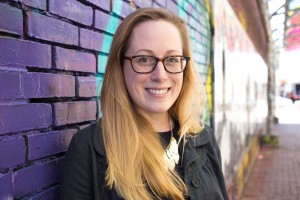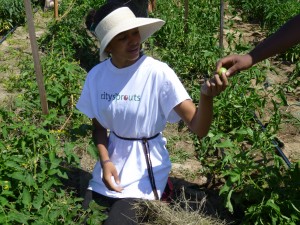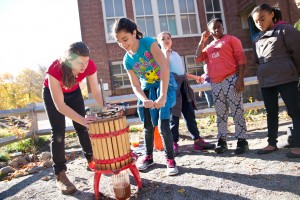It’s a crisp, sunny fall day perfect for pressing fresh apple cider. I’m at the Tobin Montessori School in Cambridge to volunteer at one of CitySprouts’ annual cider pressings and speak with Andrea Locke, their Community Relations Director. CitySprouts is a non-profit organization that partners with public schools to build school gardens and incorporate them into the curriculum. It began in two Cambridge schools in 2001 and has since expanded to include 24 public schools in Boston and Cambridge.
Andrea and I find a spot to sit on the leaf-strewn lawn of the school, with the garden plots behind us, and begin discussing her journey to CitySprouts. Although she has only been working for the organization since last spring, it is clear that she believes in the CitySprouts mission, especially its commitment to experiential learning.
Andrea is a firm believer in the idea of “learning best by getting your hands dirty.” She explains that planting seeds and watching them grow is “very hands-on” and “a very visceral experience that I just think is vital to learning.”
As a native of the Finger Lakes region of New York, Andrea grew up playing in gardens. When it was time to go to college, she chose Warren Wilson College in North Carolina. Warren Wilson is a very different from a typical college because, as Andrea explains it, “The entire campus is run by students.” She worked in the Office of Admissions, but other students were responsible for doing the plumbing and electricity, and everyone had to work on the 500-acre farm that provided the food for the campus.
“I feel like a lot of my life experiences have been building on each other,” Andrea explains. Her major at Warren Wilson was History and Political Science. It wasn’t until she attended graduate school at the Lund Institute in Sweden that she became more interested in social policy, which led her into the nonprofit world. Before CitySprouts, Andrea worked as an AmeriCorps VISTA member with Give US Your Poor, a Boston organization which seeks to increase public awareness of homelessness. That experience, she says, helped her gain many of the skills she is using in her work today, especially social media skills.
As Community Relations Director, Andrea is responsible for cultivating and maintaining relationships with donors as well as arranging volunteers for events such as the cider pressings. One of her goals for this year is to get the students’ families more involved with CitySprouts. As she was arranging the volunteers for cider pressing, she tried to get as many parents involved as possible. She is also responsible for planning the spring fundraising event, Dig It!, and has lowered the ticket prices to encourage more parents to come.
The importance of fundraising for a non-profit cannot be understated. None of CitySprouts’ work would be possible without Andrea’s work. In addition to the school partnership program, CitySprouts offers an after-school program and a summer program for middle school students. Adequate fundraising allows them to provide these programs free for all students, permitting more children from lower-income families to participate.
The school garden plots that CitySprouts helps the students to tend do not produce enough vegetables to supply the cafeteria, so instead the students or teachers take home the produce to share it with their families. Andrea also tells me that they like to allow some of it to “die on the vine,” so that students can see how vegetables decompose and understand that as a part of nature.
CitySprouts does, however, interact with the school cafeterias in other ways. Andrea tells me that the cafeteria staff will sometimes use fresh herbs from the garden. Last spring, the 6th, 7th, and 8th graders in CitySprouts’ after-school program each developed their own sauce for the local coconut-crusted redfish that is served in Cambridge cafeterias. The students voted to select their favorite, and the winning sauce is now served in all Cambridge cafeterias.
The summer program allows middle school students to engage more with the gardens and understand the larger food system. The lunches provided to the students as a part of the program are made with the produce they helped to grow. Furthermore, the activities encourage them to consider the larger food system outside of the garden plot. In one assignment, they imagine the journey of a product from the farm to the grocery store and calculate what percentage of the final price goes to the farmer. The students also volunteer at Gaining Ground, a farm in Concord that provides produce for food pantries, which gives them the opportunity to see how a full-scale farm operates.
Today, nutrition is often broken down into nutrients and calories, but CitySprouts takes a more holistic view. Andrea explains, “we believe that introducing vegetables and just getting students more familiar with them will just make them more comfortable, so when they see it again, they’re more likely to eat it.”
She also appreciates the sense of ownership the CitySprouts method gives the kids. She explains how the little kids will plant the beans, measure them, watch them grow, “and then they eat the beans, and they really like them,” she concludes, visibly giddy.
The cider pressings are a little bit different than the majority of CitySprouts events. Although it is still hands-on, it is less of an educational event and more of a fun one to get the kids outside to see the garden and involve teachers who have not used the garden in their curriculum. The apples are from Kimball Farm, about 40 miles outside of Boston, and are what is known as “second-pick” apples, “so they’re pretty gnarly looking, but it makes no difference for cider,” Andrea explains.
As a Texas native, I’ve never made cider, so I get a quick explanation of the process before the next class comes out. I am at the chopping station, helping the students to cut the apples into chunks with butter knives. After the washing, chopping and mashing have been completed, we all gather around the cider press, a wood and red-painted metal contraption that, like the apple masher, looks most akin to something the pioneers would have used.
We all take turns helping to twist the press until it is tight and then to pump the lever until all the juice is squeezed out of the mashed apples. Next, we distribute the cider in compostable paper cups, and ask the students to wait to drink because we are going to do a toast. Since apple cider pressing is a fall tradition in New England, we decide to toast to fall. We all say “To Fall!,” clink our paper cups together, and have a sip. It’s easily the best apple cider I’ve ever had and the kids can’t get enough of it.


